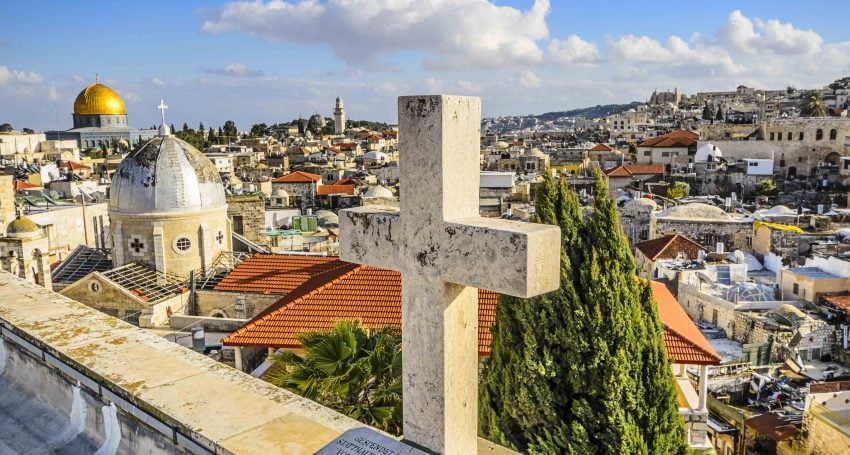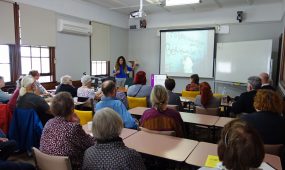Journeying and pilgrimage
Reflections
The Rev’d Dr Ray Barraclough explores the Christian traditions of ‘journeying’ and ‘pilgrimage’, with a particular focus on the continuing trauma experienced by both Jews in Israel and Palestinians in ‘the Occupied Territories’

While this article starts with the word ‘journeying’, I want to focus first on pilgrimage.
The word pilgrims tends to be confined to its religious sense. It describes those who travel distances to a holy site, a revered mountain, a sacred river. Here in Australia the only ancient sacred sites I know of are those held dear by our Indigenous peoples.
The practice of Christian pilgrimage was largely established under the Roman Emperor Constantine, and, in particular, through the journeying of his mother Helena to what came to be called the ‘Holy Land’. That was a naming that gained special prominence – for good and ill – during the violent Crusader period.
Pilgrimage is typically more a feature of Catholic and Orthodox theologies. Word-focussed Protestant Christianity traditionally has next to no interest in holy sites and holy objects.
But, let me focus on dimensions of pilgrimage in the so-called ‘Holy Land’. At the end of the 19th century, great numbers of Russian Christians would trek on foot for over a year from their homeland to the Holy Land to have their faith infused by the holy sites and rituals. Currently, Christians across a spectrum of traditions make the journey. Far fewer Russian Christians come now, but Catholic, Orthodox (especially Greek widows) Anglican and other Christians make that journey.
Indeed, there is an Anglican centre, located in East Jerusalem, which has over the years provided a welcoming and nourishing context for pilgrimage. I am referring to St George’s College, which describes itself as “a Christian-based centre in the Holy Land for Pilgrimage, Fieldwork, Study and Reflection”. Another integral experience that it offers is the camaraderie of journeying together as a band of pilgrims in the courses that the college offers.
Advertisement
‘Journeying’ encompasses a wider landscape of experience than does pilgrimage. People can journey in their life’s experience without leaving their physical location. Indeed, even to pass through our years is a journey.
When my wife, Dorothy, and I journeyed to Jerusalem to be members of the staff at St George’s College in 1989, we had to be prepared to take in a larger social, political, economic and cultural landscape than we had ever experienced before. We had a lot of learning to do.
In such a brief reflection as this one, one can only open a window or two to gain a sense of life experiences for people in the region.
One insight that guides me was voiced by a Jewish Israeli1 speaker at a meeting we attended. She observed that both the Jewish and the Palestinian people were traumatised.
The trauma of centuries of Christian anti-Jewishness, sadly, still accompanies Jewish communities. The seeds that have inadvertently bred such ill feeling were planted in the Christian scriptures. Sadly, Biblical passages that are shaped by 1st century anger (and bigotry) against Jews are, when read in services in modern Anglican churches, still greeted with the pious intonation: “This is the word of the Lord”. For example Matthew 27:25 – ‘His blood be on us and on our children’ – a passage which has had horrendous consequences for Jews in Christian Europe for centuries. Some Anglicans even believe that such passages are infallible! So, some Anglicans have yet to journey to reduce that trauma that has had such a long and tragic history.
Advertisement
The trauma of the Palestinian people is of much more recent provenance. It is based on decisions made a century ago by power-holders in the then British and French empires, including the Balfour Declaration of 1917, which stated the British government’s intention to facilitate “the establishment in Palestine of a national home for the Jewish people.” It is related to the unresolved issue of the sharing of the land claimed by both Israel and Palestine, with the United Nations mandating that Palestinians be enabled “to exercise their inalienable rights, including the right to self-determination without external interference, the right to national independence and sovereignty, and the right to return to their homes and property from which they have been displaced.”
Currently Israel holds the overwhelming power, both militarily and politically, in the disputed region. When conflict occurs, trauma amongst both peoples increases. It seems at times that it is ‘a chicken and egg’ situation as regards causation of present conflicts. For example, life under Occupation builds pressure for Palestinians to retaliate. Rockets fired into Israel from Gaza, or the disproportionate destruction wrought by the retaliatory Israeli bombing on Gaza, all of these have dehumanising human consequences.
Related Story
 Reflections
Reflections
Young Palestinian Christian visits Brisbane to share her story
For Palestinians who live in what are termed ‘the Occupied Territories’ they encounter the spread of Israeli power daily. Whether at the numerous Israel checkpoints, or enduring confrontations from the illegal settlers in the Occupied Territories, they are continuously reminded of their dispossession. With the exception of our Indigenous brothers and sisters and others who have sought refuge on our shores, we Australians have had no experience of occupation. It is no bed of roses. As author John Lyons writes in his recent book Balcony Over Jerusalem:
“If the whole world could see the occupation up close, it would demand that it end tomorrow. Israel’s treatment of the Palestinians would not pass muster in the West if the full details were known.2
Many other windows can be opened to gain insights into this Middle Eastern region. I hope this article may deepen your pilgrimage and help you to journey with more empathy into the world behind a rapid media cycle’s depictions of two traumatised peoples.
1 The overwhelming majority of Israelis are Jewish, but almost 20% of Israel’s population are Palestinian (Arab) Israelis.
2 John Lyons with Sylvie le Clezio, 2017. Balcony Over Jerusalem – A Middle East Memoir. Harper Collins Publishers, Sydney: 367.





